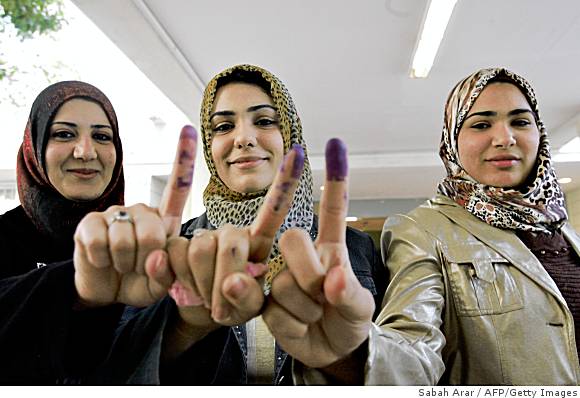Women and Democracy - Dignity, Equality and Justice for All
Democracy (“rule by the people” when translated from its Greek meaning) is seen as one of the ultimate ideals that modern civilizations strive to create, or preserve. Democracy as a system of governance is supposed to allow extensive representation and inclusiveness of as many people and views as possible to feed into the functioning of a fair and just society. Democratic principles run in line with the ideals of universal freedoms such as the right to free speech.
Importantly, democracy supposedly serves to check unaccountable power and manipulation by the few at the expense of the many, because fundamentally democracy is seen as a form of governance by the people, for the people. This is often implemented through elected representatives, which therefore requires free, transparent, and fair elections, in order to achieve legitimacy.
The ideals of democracy are so appealing to citizens around the world, that many have sacrificed their livelihoods, even their lives, to fight for it. In many ways, the amount of propaganda and repression some non-democratic states set up against their own people is a testament to the people’s desire for more open and democratic forms of governance. That is, the more people are perceived to want it, the more extreme a non-democratic state apparatus has to be to hold on to power.
However, even in established democracies, there are pressures that threaten various democratic foundations. A democratic systems' openness also allows it to attract those with vested interests to use the process as a means to attain power and influence, even if they do not hold democratic principles dear. This may also signal a weakness in the way some democracies are set up. In principle, there may be various ways to address this, but in reality once power is attained by those who are not genuinely support democracy, rarely is it easily given up.

Women and Democracy
Over time democracy, as a political system, has developed mechanisms to integrate marginalized groups mechanisms such as quotas or regional arrangements to amplify the concerns of politically disenfranchised groups. Women are often in the majority of populations, yet they face a wide range of constraints to effective participation even in the most basic of democratic exercises such as running for political office, and in some countries women are still unable to vote.
The consequences of constraints on participation are well-known. Women make up less than 20% of legislators and less than 5% of ministers. Women have found themselves consistently constrained by traditional gender roles in the exercise of their political rights even in the most robust of democracies. The second constraint regards effective voice.
Effective public participation depends on being able to articulate interests and form a constituency to advance those interests. We have to ask ourselves — do we put enough resources into women’s civil society organizations so that women can pursue their interests? Do political parties reflect and respond to women’s concerns? We must remember that democracies can deliver majorities that actually — in the name of a democratic process — can impose restrictions on women’s rights. This can happen when there is not enough diversity and voice for women in politics.
If political party and government structures do not take into account women’s needs and priorities, and the media and traditional and cultural practices consistently minimize women’s value in political life, then democracies cannot deliver for women. What is more, the quality of democracy itself is weakened.
Susan B Anthony, a famous campaigner for women’s right to vote, said, "There never will be complete equality until women themselves help to make laws and elect lawmakers."
We have to ask whether democratic institutions yet consider and answer to women. True democracy is about more than just participation — it is about the checks and balances and accountability institutions that allow women to seek redress when their rights are abused and their needs are ignored.
Making Democracy Real for Women and for ALL
There are three basic requirements are critical for making democracy real for women - which in turn makes it real for ALL.
First, we have to remove the obstacles that keep women from participating effectively: mobility, finances, access to information, lack of public safety, and coercion, intimidation and violence.
Second, we must recognize that participation is one thing but real voice is another. Are women able to articulate and voice their rights, needs and preferences? How far are political parties internally democratic ? Have women in civil society had the opportunity to debate common positions on the constitution, electoral law, safety during campaigns, and other issues?
Third and finally, democratic institutions have to be held accountable to women, and held accountable for meeting commitments to women’s rights. If a democracy neglects women’s participation, if it ignores women’s voices, if it shirks accountability for women’s rights, it is a democracy for only half its citizens.
We seek a world of true equality where women and men stand together in shared leadership, mutual responsibility and peace.